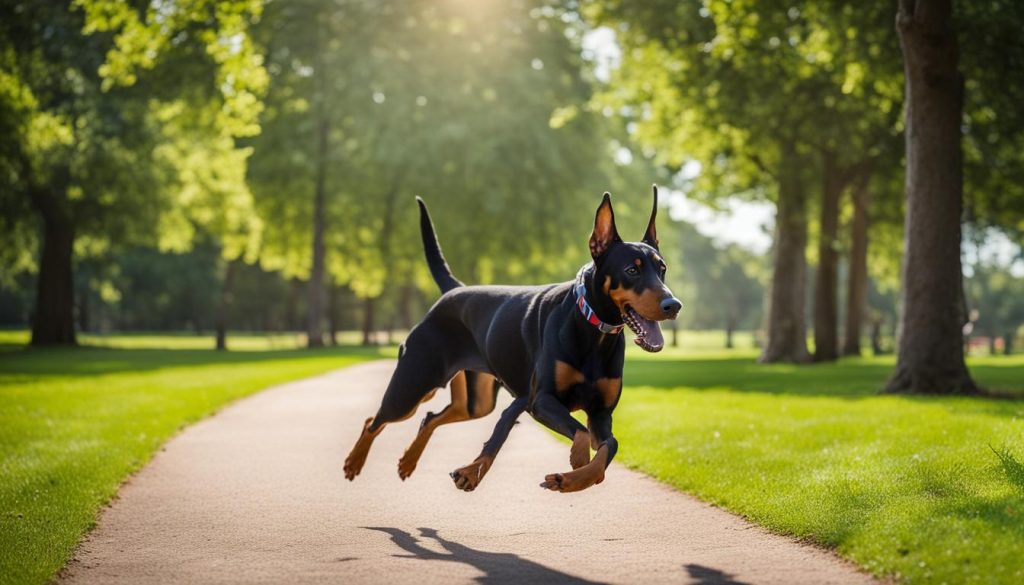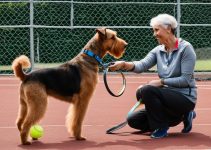The Doberman Pinscher is a breed known for its loyalty, courage, and intelligence. Proper training is essential to ensure that your Doberman becomes a well-behaved and obedient companion. In this article, I will provide you with expert tips and techniques for successful Doberman Pinscher training. These tips include advice from experienced breeders and trainers on topics such as starting off on the right foot with a reputable breeder, socialization, housetraining, recall and attention training, managing puppy biting, and more. With the right approach and consistency, you can unlock the potential of your Doberman and develop a strong bond with your furry friend.
Doberman Pinscher Training
- Start off on the right foot by finding a reputable breeder who socializes their puppies and conducts recommended health and genetic screenings.
- Socialize your Doberman puppy by exposing them to new people, situations, and surfaces in a controlled manner.
- Establish consistency in housetraining through crate training and following the foundations set by the breeder.
- Introduce recall and attention training early on, using positive reinforcement to encourage your Doberman’s obedience.
- Manage puppy biting by ensuring your puppy gets enough sleep and rest, and continue building on basic obedience training.
Getting Off to the Right Start
To set the foundation for successful Doberman Pinscher training, it is important to start off on the right foot. This begins with finding a reputable breeder or breed rescue who has already begun socializing their puppies. Reputable breeders expose their puppies to new objects, surfaces, and noises from an early age to ensure they have the best possible start. Additionally, it is important to ask the breeder about health and genetic screenings to ensure that you are getting a healthy puppy.
- Reputable breeder: Finding a reputable breeder is crucial when starting your Doberman Pinscher training journey. A reputable breeder will prioritize the well-being and health of their puppies, providing a solid foundation for training.
- Socializing puppies: Socialization plays a vital role in a Doberman’s development. By exposing them to new people, places, and experiences, you can help reduce fear and anxiety, making them more confident and well-adjusted dogs.
- Exposing puppies to biostimulation: Biostimulation involves exposing puppies to various stimuli, such as different surfaces, sounds, and objects. This helps them develop a better understanding of their environment and adaptability.
- Recommended health and genetic screenings: Ensuring that the breeder conducts health and genetic screenings can help identify and mitigate potential health issues in your Doberman. This proactive approach sets the stage for a healthier and happier dog.
Smart Socialization Is Key
Socialization is a crucial aspect of Doberman Pinscher training. It involves exposing your puppy to new experiences and situations in a controlled manner. By doing so, you can help them become well-rounded and confident dogs. Here are some important factors to consider when it comes to socialization:
Avoiding Dog Parks
While dog parks may seem like an ideal place for socialization, it is generally advised to avoid them when it comes to Doberman puppy socialization. The reason for this is that dog parks can have unpredictable temperaments, unknown vaccination statuses, and varying levels of training among other dogs. This can create a potentially risky environment for your puppy.
Finding a Good Dog Mentor
Instead of dog parks, it is recommended to find a good dog mentor for your Doberman puppy. A dog mentor is a well-behaved and socialized dog that can serve as a positive role model for your puppy. By observing and interacting with a mentor, your puppy can learn appropriate behaviors and social cues.
Introducing Puppies to New People and Situations
Introducing your Doberman puppy to new people, situations, and surfaces is crucial for their socialization. This can be done by gradually exposing them to different environments, such as parks, streets, and public spaces. It is important to ensure that the introductions are positive and gentle, allowing your puppy to build confidence and trust in new experiences.
Remember, smart socialization is key to raising a well-adjusted and confident Doberman Pinscher. By avoiding dog parks, finding a good dog mentor, and introducing your puppy to new people and situations, you can help them develop into a happy and well-socialized companion.

Housetraining Is Achieved Through Consistency
Housetraining is a crucial aspect of Doberman Pinscher training. The key to successful housetraining lies in consistency. By establishing and maintaining consistent habits, you can effectively teach your Doberman to understand where they should eliminate.
Crate Training
Crate training is a valuable tool in achieving housetraining success. It involves providing your Doberman with a designated space, typically a crate or a small enclosed area, where they can rest and stay when unsupervised. This space should be comfortable and cozy, resembling a den-like environment.
Housetraining Foundations
Reputable breeders often initiate the foundations of housetraining before sending puppies to their new homes. This initial training lays the groundwork for housetraining success. As a new owner, it’s crucial to continue this consistency by following the breeder’s guidelines and routines.
Establishing a Routine
In addition to crate training, establishing a routine is essential for effective housetraining. Set a regular schedule for meals, water breaks, and bathroom breaks. Taking your Doberman outside to their designated potty area at consistent intervals will help them understand when and where they should relieve themselves.
Clean-up and Positive Reinforcement
Accidents may happen during the housetraining process, especially in the early stages. When accidents occur, it’s important to clean up the mess promptly and thoroughly to prevent lingering odors. Additionally, introducing positive reinforcement, such as praise or treats, when your Doberman eliminates in the designated area will further reinforce the desired behavior.
By employing crate training, building on housetraining foundations, establishing a routine, and utilizing positive reinforcement, you can set the stage for successful housetraining and help your Doberman become a well-behaved member of the family.
Introduce Recall and Attention Training
Recall and attention training are vital aspects of Doberman Pinscher training journey. Teaching your puppy to come when called and focus on you not only ensures their safety but also helps foster a strong bond between you and your furry companion.
Introducing recall training at an early age is key to establishing this important command. Start by using treats and encouragement to encourage your puppy to come to you when called. Gradually increase the distance and distractions. By making the training sessions fun and rewarding, your Doberman will learn to associate coming to you with positive experiences.
In addition to recall training, it is crucial to teach your puppy polite greetings. Dobermans have a natural tendency to jump and paw for affection, which can be overwhelming or even intimidating for some people. By providing clear instructions and using positive reinforcement techniques, you can teach your Doberman to greet people politely.
One effective method for teaching polite greetings is to practice controlled greetings with friends or family members. Ask them to approach you and your puppy calmly, ensuring that your Doberman remains seated or in a calm state. Reward your puppy for staying calm and reinforce the behavior consistently. Over time, your Doberman will learn appropriate greeting behaviors, contributing to their overall good manners.

Manage Puppy Biting and Continue Building on Basic Obedience Training
Puppy biting is a common challenge during training, but understanding its underlying causes can help you effectively manage this behavior. It’s important to note that puppy biting is often a result of sleep deprivation. When puppies don’t get enough sleep and rest, they may become overstimulated and exhibit more biting behavior.
To address puppy biting, prioritize the importance of sleep for your Doberman puppy. Create a comfortable and quiet sleeping area for your puppy and establish a consistent sleep routine. Providing your puppy with plenty of naps throughout the day will ensure they are well-rested and less likely to engage in excessive biting.
In addition to managing puppy biting, it’s crucial to continue building on basic obedience in Doberman Pinscher training. Teaching commands such as sit, stay, and lie down lays the foundation for a well-behaved and obedient companion.
Consistency in Training and Clear Expectations
To ensure success in basic obedience training, consistency is key. Set clear expectations for your Doberman and reinforce positive behaviors consistently. Use positive reinforcement techniques, such as treats and praise, to reward desired behaviors.
Remember to remain patient and persistent throughout the training process. Each Doberman is unique and may require different training methods. Observe your puppy’s response to certain techniques and adjust your approach accordingly.
- Practice bite inhibition: Teach your puppy to control the force of their bite. When your puppy bites too hard, let out a yelping sound to signal discomfort, and immediately stop interacting with the puppy. This helps them understand the consequences of biting too aggressively.
- Redirect their biting: Provide appropriate chew toys and redirect your puppy’s biting behavior towards these toys. When your puppy starts mouthing or biting you, replace your hand or clothing with a chew toy and encourage them to chew on it instead.
- Consider professional guidance: If you find managing puppy biting challenging, consider seeking help from a professional dog trainer or behaviorist. They can provide personalized guidance and training techniques to address specific issues.
By managing puppy biting and continuing to build on basic obedience training, you will help shape your Doberman’s behavior and ensure a well-rounded and obedient companion.
Conclusion
Doberman Pinscher training requires dedication, consistency, and a positive approach. By starting off on the right foot with a reputable breeder, socializing your puppy, establishing housetraining routines, and practicing recall and attention training, you can set the foundation for a well-behaved and obedient companion.
It is important to remember that each Doberman is an individual, and training methods may need to be tailored to their specific needs and personality. The key to successful Doberman training is finding what motivates and rewards your dog, whether it’s treats, toys, or praise. Positive reinforcement, such as clicker training or using verbal cues, can help you establish clear communication and build a strong bond with your Doberman.
With the right Doberman Pinscher training techniques and a strong bond, you can unlock the full potential of your Doberman Pinscher. Remember to be patient, consistent, and always practice with a calm and confident demeanor. By investing the time and effort in training your Doberman, you will be rewarded with a well-behaved and loyal companion for years to come.
FAQ
Can I train a Doberman Pinscher myself?
Yes, you can train a Doberman Pinscher yourself with the right approach, consistency, and commitment.
What is the best training method for Doberman Pinschers?
Positive reinforcement training is generally considered the best method for training Doberman Pinschers. This involves rewarding desired behaviors with treats, praise, and affection.
How early should I start training my Doberman puppy?
It is recommended to start training your Doberman puppy as early as possible, ideally at around 8-10 weeks of age.
How important is socialization for a Doberman Pinscher?
Socialization is extremely important for a Doberman Pinscher. It helps them become confident, well-adjusted dogs and reduces the risk of behavioral issues.
Should I take my Doberman puppy to dog parks for socialization?
It is generally advised against taking your Doberman puppy to dog parks due to the unknown temperaments, vaccination status, and training of other dogs. It is better to find a good dog mentor or controlled socialization opportunities.
How can I housetrain my Doberman puppy?
Consistency is key in housetraining your Doberman puppy. Using crate training, establishing a routine, and providing positive reinforcement for desired behaviors can aid in successful housetraining.
How can I teach my Doberman to come when called?
Teaching recall training to your Doberman involves using treats, praise, and positive reinforcement. Starting with short distances and gradually increasing them can help train your Doberman to come when called.
How can I manage puppy biting?
Puppy biting is often a result of sleep deprivation. Ensuring that your Doberman puppy gets enough sleep and rest can help reduce biting behavior. Redirecting their attention to appropriate chew toys and continuing basic obedience training can also help manage biting.






